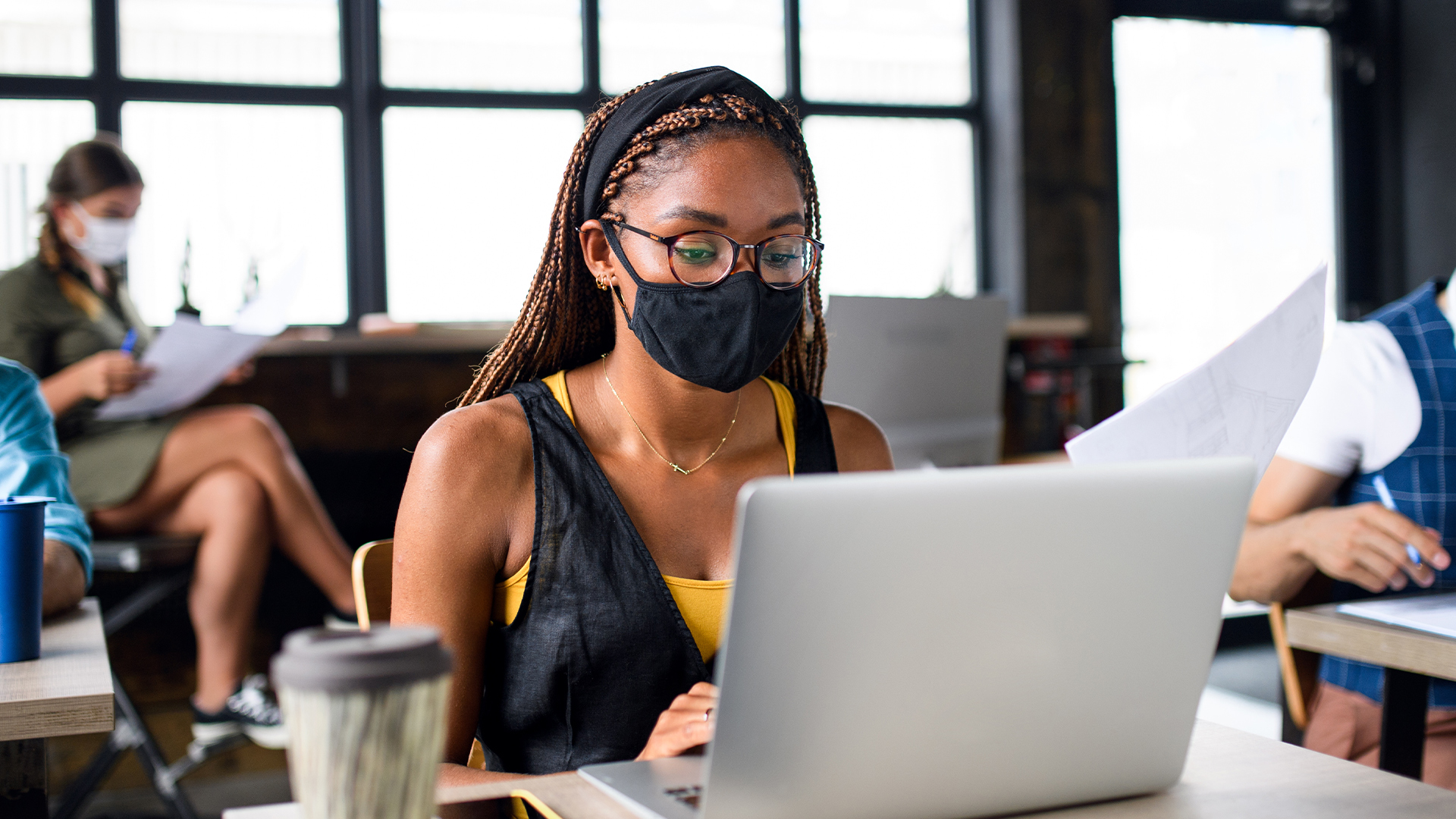COVID-19 Coping Corner for Students
The OCS Student COVID-19 Coping Corner is designed to help students, and the University Community, cope with COVID-19 and the challenges it has brought on. As we work through this situation together, please feel free to utilize these strategies and resources.

When you need support, we're here.

Coping Skills For College Students

-
Maintain A Regular Daily Routine
- Continue to keep your schedule. Keep your appointments and continue to attend your classes. If you don't have a schedule, use a calendar or planner to organize your assignments and personal commitments.

-
Exercise
- Get moving, catch some sun rays for some much needed vitamin D, and start a healthy habit. Running, walking, basketball, skating, or kickball are just a few ways to exercise. Whatever activity you choose, try to move at least three times a week for 30 minutes. Remember to use social distancing and wear your masks!

-
Take Care of Yourself
- Self-care is the best way to attend to your physical, emotional, and mental needs. Take a hot shower/bath, light candles, exercise, journal, set goals, meditate, get a good night's sleep, take your medications, take a break, and be kind to yourself.

-
Reach Out To Family and Friends
- Phone calls, texts, Zoom, Duo, WhatsApp, and Facebook Messenger are just some examples of ways to keep in touch with your loved ones. Keeping connected with family and friends reduces feelings of loneliness and isolation.

-
Have A Coping Plan
- Make sure you have a coping plan. Have emergency numbers, immediate contacts, and a coping plan of action ready during difficult emotional times. These include emergency contacts, physicians, therapists, psychiatrists, pharmacies, etc.

Taking Charge of Stress and Anxiety: The coronavirus outbreak and the escalating measures taken to manage the pandemic may cause high levels of stress for us all. Fear and anxiety about illness, as well as the uncertainty and changes that affect our work, can be overwhelming. However, there is always something you can do to address these feelings.

-
Change Your Thinking
- Accept that feeling anxious is a natural response to uncertainty
- Appreciate anxiety as an alert that helps you find ways to address stressors
- Separate real risks from the unlikely threats your mind is creating
- Remember that you can choose how you respond to stressful situations
- Remind yourself of challenges you have overcome before
- Recognize that this is temporary and will pass
- Focus on taking it one day at a time
- Ask yourself what good you can make out of all this situation

-
Seek Professional Help If:
- Your worry feels uncontrollable and unmanageable
- You are having extreme difficulty sleeping or managing normal daily activities
- You are experiencing high levels of distress at home, at work or in relationships
- You find yourself using substances like tobacco or alcohol excessively
- The situation is triggering previous painful issues

-
Change Your Behavior
- Stay connected to your loved ones
- Pause and focus on the present moment
- Try a relaxation or meditation technique
- Maintain a regular daily routine
- Watch something funny or inspirational about the situation
- Take care of yourself. Eat healthy, exercise, and avoid excessive substance use
- Ask for help if you need it
- Find ways to help others
- Limit your exposure to news about the virus

Increasing Motivation: Know your strengths, know your weaknesses, and ask for help. All your hard work and efforts will pay off in the end.

-
Prioritize Your Tasks
- Make a task list every day of things to be done. Rank them in order from easy to difficult. Make time every day to tackle those tasks. It can be challenging to get anything achieved if you are overwhelmed. However, if you utilize a planner, time management, and follow your plan big tasks become manageable.

-
Acknowledge your Small Achievements
- Celebrate the small wins! Achieving smaller goals is just as important as achieving larger ones. Treat Yourself. Whether small or large, every accomplishment deserves a reward. Keep track of your victories so you can reflect on them in the future.

-
Develop A Daily Routine And Stick To It
- Time management is crucial for success. Make sure you not only make time for studying, but also self-care. A 15 minute walk, a 15 minute break, and making sure you are eating/resting properly are all good examples of good self-care. Make healthy choices and a healthy lifestyle a habit.

-
Connect To Your Support System
- Connect with those you love and trust to share in your success and as well as times you are feeling stressed or overwhelmed. Talking to someone who truly cares about you, reduces stress and supports you when you need it most.

-
Set Small Goals Each Day
- Make small goals to achieve every day. Make sure bigger tasks are broken down into smaller parts. Perhaps that presentation or project due next month can be broken down into smaller parts. Each part can be addressed daily to meet the deadline and you can make the grade you desire.

-
Failure Does Not Meant Finished
- "Failure is the mother of success." It can be discouraging, but do not let it deter you from the goal at hand. Try other methods, ask for help, talk to someone about how you feel. Everyone has failed before, but it takes courage to face our toughest challenges.

-
Re-evaluate and Regroup
- Sometimes our plans don't work out the way we want them to. That is okay. Evaluate the processes that you are using and if they don't work for you try another course of action. Look at the pros, cons, strengths, and weaknesses of your plan. Nothing and no one is perfect. Remember adaptability and flexibility are your friends.

-
Don't Sweat The Small Stuff
- Everything you experience (good, bad, big, or small) is for a reason. Your primary goal when you began this academic journey is graduation. Graduation can seem more like an ideal than a reality. Remember that not every path can be taken by everyone and not every course will be smooth.

Coping With Loss of A loved One

-
Allow A Grieving Period
- Give yourself time to cry and remember your loved one. This can be as short as 15 minutes a day or longer if needed. Allowing yourself time to mourn will help you come to terms with the loss.

-
Visit a Spirtual Contact According to Your Faith
- visit with your spiritual contact will be beneficial to your grieving process. They will allow you to feel that you are not alone. You can also reach out to a grief counselor. They can work with you individually to find methods that work best for you.

-
Create A Memory Book
- Put your memory book together at a time when you are relaxed and not rushed with other obligations. You can put pictures of your loved one, or cards they sent you in a photo album or scrapbook.

-
Talk With Friends
- Friends listen and do not judge. Pick up the phone and call a friend to talk or schedule a visit. You can also use social media sites to connect with friends who have moved or you lost touch with. They will understand that you just need a few moments to talk.

How To Help A Friend

-
Recognize the Signs of Someone Who Needs Help
- Isolation
- Anxious/Nervous/Afraid
- Displaying behaviors not consistent with their everyday behavior
- Participating in actions/behaviors that are dangerous/harmful
- Talking about feelings of hopelessness, sadness, or depression
- Increased use of alcohol or drugs
- Not attending class or meetings
- Threatening to or actually harming themselves

-
What To Do For Someone Who Needs Help
- Be supportive
- Listen
- Express your concern and why you are concerned
- Respect their privacy by speaking to them one on one
- Refer them to someone who can help (i.e. professor, advisor, counselor, religious leader)
- Know their emergency contacts and how to contact them
- If they express desire to harm themselves or someone else, call the police or transport them to the nearest hospital



